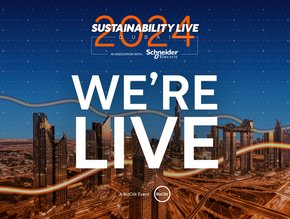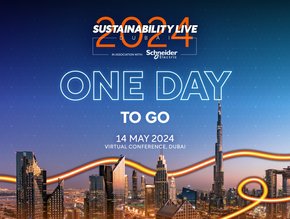
As the digital revolution evolves it becomes more resource intensive.
Data centres – the infrastructure behind the technical innovations powering the world today – are some of the most energy-hungry technologies.
Some countries, including Germany, Singapore and China, have introduced restrictions on the development of new data centres to attempt to curb the emissions impacts.
In Ireland, data centres are due to amount to nearly a third of national electricity demand by 2026 – partly due to server farms run by companies including Google and Microsoft. The surge in data centres is partly due to the necessity to support new technologies including AI.
So, as digitisation and AI adoption charge forward at impressive speeds, what is the impact on the environment and is there potential to aid sustainability advances?
Integrating sustainability into digital transformation strategy
Many companies are approaching digital transformation and reducing energy consumption as a combined opportunity.
By embedding sustainability into the heart of wider business strategy, including digital transformation, businesses are seeing potential open up in areas including circular economy and renewable energy solutions.
Dr James Robey, Executive Vice President, Global Head of Environmental Sustainability at Capgemini, believes that the technology industry has a crucial role to play in achieving global sustainability goals – especially in reducing carbon emissions.
“Technology has the potential to positively impact many environmental issues, but it can also have unintended consequences,” he says. “IT accounts for around 3% of global CO2 emissions – more than Spain, Italy, France, and Portugal combined.
“This footprint is currently growing due to rising demand for computing power and data storage, as well as the production and disposal of electronic devices. It's important to consider the impact of IT as organisations strive to balance growth objectives with sustainability goals.”
Capgemini research has found that organisations implementing sustainable IT practices see significant improvement in ESG scores, brand image, customer satisfaction and financial savings.
“With most companies undergoing some sort of digital transformation within the next year, ensuring sustainability objectives are integrated into these strategies is crucial,” says Kevin Macnish, Head of Ethics and Sustainability Consulting at Sopra Steria.
“Companies are considering the environmental impact of technologies such as AI and taking action to reduce them by shifting workloads to sustainable data centres, moving operations to the cloud or restricting usage.
“Reporting standards for measuring and disclosing emissions allow companies to be open and transparent about their environmental performance when undergoing a digital transformation. This can allow companies to build a competitive advantage, improve their reputation and contribute to developing a net zero economy for all.”
The early stage development of technologies and digital strategy presents a unique opportunity to include the environmental impact whilst onboarding and developing.
Dark data: A black hole of energy wastage
As technology develops, the amount of data we are processing grows. Dark data – information that is collected but not used – accounts for over half of all stored data and is responsible for extensive energy wastage.
In the United States, power consumption due to data centre data storage was estimated to be at 14 billion kWh in 2020, resulting in almost 6.5 metric tons of CO2 emissions.
“Businesses and data centres should start by simply taking control of data storage, assessing the storage rules and ensuring they are not holding data that is no longer needed,” believes Aoife Foley, IEEE senior member and Professor in the School of Mechanical and Aerospace Engineering at Queen’s University Belfast.
“It is essential that leaders improve their data management policies, identifying which data is in fact valuable and eliminating any dark or redundant data from their data centres to avoid emissions spiralling out of control and avoid unnecessary digital waste.
“Leaders should also enquire about their data centre provider’s multi-site footprint and its ability to enable distributed network availability and dynamic load placement.
“Identifying workloads that can be transferred from peak demand periods to off-peak hours ultimately results in lower costs for all parties.”
This is where the opportunities presented by AI come in.
AI as a tool for sustainability
Whilst it is true that technology can be incredibly energy-intensive, be it through data, or lack of sustainable considerations when developing and onboarding, technology also presents great opportunities. Many companies are exploring AI for its potential to offer innovative and scalable solutions to sustainability issues. Increasingly, businesses are finding that they do not need to choose between economic growth and environmental responsibility:
“Disruptive technologies like AI, IoT and ML present opportunities for positive sustainable impact for virtually any industry,” says Chris Bradshaw, Strategy Director, Infinum.
“In manufacturing, for example, AI is being used to predict machine downtime, not only improving efficiency in the production line but also reducing waste.”
Capgemini is using AI to optimise value chains, reduce waste and maximise production to reduce food scarcity through its Project Farm initiative.
AI-driven data analytics can unlock business insight, allowing leaders to make informed decisions, promote eco-friendly strategies and reduce their overall environmental impact.
“Technologies like the digital twin can and are already playing a crucial role in reducing emissions,” Macnish adds.
“As a virtual replica of a real-world entity, digital twins can be used to model and monitor elements impacting environmental performance, such as carbon embodiments, and simulate a ‘what if’ scenario on how to effectively counter them.
“In the real world, this can be applied to organisational or industry-wide sustainability strategies - with the technology capable of reducing carbon emissions in a building by up to 50%.”
“Overall, the AI boom has given rise to a plethora of new cloud services aimed at data analytics, real-time decision-making and automated workflows, and I don’t expect this to slow down anytime soon,” concludes Lynn Collier, Global Solutions Manager at Hitachi Vantara.
“In fact, as the cloud computing industry strives to keep up with the pace of AI innovation, many organisations have become increasingly focused on sustainable cloud solutions, given the high energy demands of AI operations. Hybrid data centres that utilise both on-premises and cloud resources can offer an energy-efficient approach to handling AI workloads.”
AI - An energy intensive tool or the answer to efficiency?
Despite its incredible potential, AI is still a relatively new technology and its uses are still being explored. There is undeniable evidence that it could be instrumental in boosting efficiency for buildings, organisations and value chains, reducing energy consumption, emissions, supporting the transition to renewable energy and the global journey to net zero. This will depend, however, on its implementation.
Organisations need to consider sustainability goals when onboarding new technologies, designing and implementing digital strategy and developing new, energy-intensive technologies.
The journey to net zero is not a passive one – organisations need to be proactive, forward thinking and sustainability-minded.
******
Make sure you check out the latest edition of Sustainability Magazine and also sign up to our global conference series - Sustainability LIVE 2024
******
Sustainability Magazine is a BizClik brand







